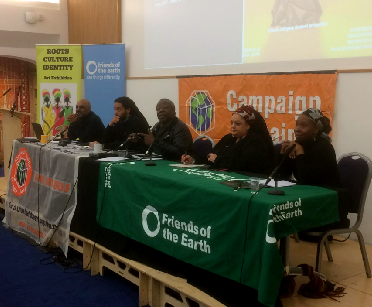Climate change 'now has a human face'
Submitted by Philip Pearson on Wed, 2017-02-15 13:18‘Climate Refugees’- The Climate Crisis and Population Displacement: Building a Trade Union and Civil Society Response - 11 February
A woman wading through flood waters is replacing the polar bear as the defining image of climate change. Delegates to the UK’s first trade union and Friends of the Earth conference on Climate Refugees (Saturday 11 February) learned that in the past six years over 140 million people have been displaced through climate-related disasters – one person every second.
The risks will redouble in coming decades, reversing years of development activity in the global South. In a keynote speech, Asad Rehman (FoE) said that to achieve our goal of UN action to address the climate migration crisis means creating a new narrative which draws wide support across civil society and is based on the principles of ‘justice, empathy and humanity.’
Briefing delegates on the hard evidence of climate change, Prof Joanna Haigh (Grantham Institute) said that every indicator was flashing: rising sea levels, warming oceans and shrinking Arctic sea ice. ‘Globally warming is not globally uniform,’ with the greatest increases in polar regions and across sub-Saharan Africa. The current growth in carbon emissions would place as much as a quarter of the world’s population exposed to water scarcity, flooding impacts and crop failures.
For Unite the Union, Diana Holland was ‘angry and ashamed’ at the government’s inhumane treatment of child migrants. Trade unions have shown through campaigns such as Chile Solidarity and organising migrant domestic workers what international solidarity can deliver. Where union members are impacted by climate change, our demand must be for a Just Transition, with everyone at the table.
Reinforcing this message, Chidi K ing (first right, see left) said that the ITUC (International Trade Union Confederation) was developing a Just Transition programme to engage trade unions, governments and communities in demands for investments in low carbon technologies, green jobs and new skills. Climate change would drive up global poverty: so zero poverty and zero carbon were two core issues for the ITUC.
ing (first right, see left) said that the ITUC (International Trade Union Confederation) was developing a Just Transition programme to engage trade unions, governments and communities in demands for investments in low carbon technologies, green jobs and new skills. Climate change would drive up global poverty: so zero poverty and zero carbon were two core issues for the ITUC.
Zita Holbourne (second right), PCS Vice-President, argued that it was impossible to separate climate change impacts from other causes of human displacement, including war, fear of persecution, famine and poverty. For many climate refugees, their ordeal is not over when they arrive in the UK, where they are often treated as third class citizens. Unless we are to pass to our children a world worse than ours, we need a new vision for race equality in 2025, based on social justice and equity.
Saturday’s workshops covered the planetary emergency, building trade union solidarity, challenging racism and xenophobia, the Moving Stories of climate migrants, and creating a new narrative around climate refugees. Also, the Environmental Justice Foundation presented its excellent short film, Falling through the Cracks.


